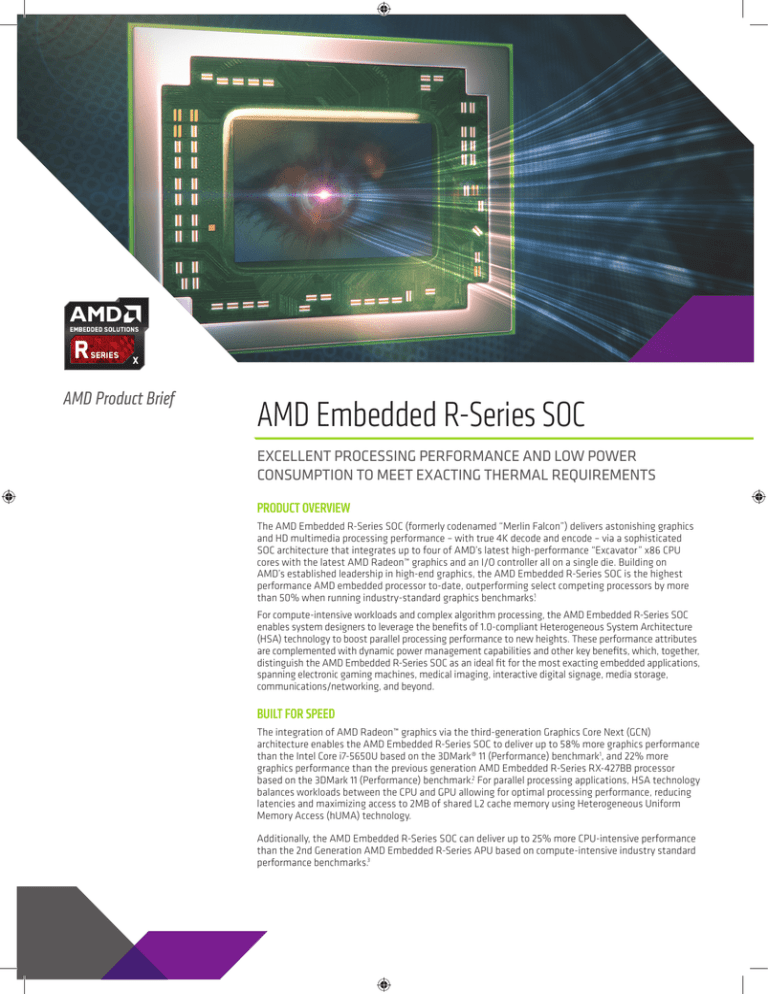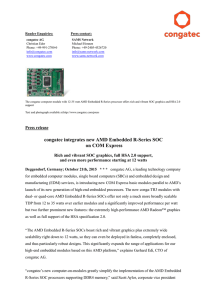
AMD Product Brief
AMD Embedded R-Series SOC
EXCELLENT PROCESSING PERFORMANCE AND LOW POWER
CONSUMPTION TO MEET EXACTING THERMAL REQUIREMENTS
PRODUCT OVERVIEW
The AMD Embedded R-Series SOC (formerly codenamed “Merlin Falcon”) delivers astonishing graphics
and HD multimedia processing performance – with true 4K decode and encode – via a sophisticated
SOC architecture that integrates up to four of AMD’s latest high-performance “Excavator” x86 CPU
cores with the latest AMD Radeon™ graphics and an I/O controller all on a single die. Building on
AMD’s established leadership in high-end graphics, the AMD Embedded R-Series SOC is the highest
performance AMD embedded processor to-date, outperforming select competing processors by more
than 50% when running industry-standard graphics benchmarks.1
For compute-intensive workloads and complex algorithm processing, the AMD Embedded R-Series SOC
enables system designers to leverage the benefits of 1.0-compliant Heterogeneous System Architecture
(HSA) technology to boost parallel processing performance to new heights. These performance attributes
are complemented with dynamic power management capabilities and other key benefits, which, together,
distinguish the AMD Embedded R-Series SOC as an ideal fit for the most exacting embedded applications,
spanning electronic gaming machines, medical imaging, interactive digital signage, media storage,
communications/networking, and beyond.
BUILT FOR SPEED
The integration of AMD Radeon™ graphics via the third-generation Graphics Core Next (GCN)
architecture enables the AMD Embedded R-Series SOC to deliver up to 58% more graphics performance
than the Intel Core i7-5650U based on the 3DMark® 11 (Performance) benchmark1, and 22% more
graphics performance than the previous generation AMD Embedded R-Series RX-427BB processor
based on the 3DMark 11 (Performance) benchmark.2 For parallel processing applications, HSA technology
balances workloads between the CPU and GPU allowing for optimal processing performance, reducing
latencies and maximizing access to 2MB of shared L2 cache memory using Heterogeneous Uniform
Memory Access (hUMA) technology.
Additionally, the AMD Embedded R-Series SOC can deliver up to 25% more CPU-intensive performance
than the 2nd Generation AMD Embedded R-Series APU based on compute-intensive industry standard
performance benchmarks.3
AMD Product Brief: AMD Embedded R-Series SOC
2
ADVANCED MULTIMEDIA AND DISPLAY FEATURES
ADDITIONAL KEY BENEFITS
The AMD Embedded R-Series SOC enables stunning video
performance, providing true 4K encode and decode and integrated
support for DirectX® 12, Unified Video Decode (UVD) 6 (4K H.2654 and
H.264 decode) and Video Coding Engine (VCE) 3.1 (4K H.264 encode).
Up to three displays are supported with options to use the Embedded
DisplayPort (eDP) 1.4, DisplayPort (DP) 1.2, Digital Video Interface (DVI)
or HDMI™ 1.4/2.0 interfaces.
• AMD’s first embedded processor with dual-channel 64-bit DDR4 or
DDR3 with Error-Correction Code (ECC), with speeds up to DDR42400 and DDR3-2133, and support for 1.2V DDR4 and 1.5V/1.35V
DDR3
POWER, TEMPERATURE AND DESIGN VERSATILITY
• High-performance Integrated FCH featuring PCIe® Gen3 USB3.0,
SATA3, SD, GPIO, SPI, I2S, I2C, UART
• Dedicated AMD Secure Processor supports secure boot with AMD
Hardware Validated Boot (HVB); initiates trusted boot environment
before starting x86 cores
Model Number
OPN
cTDP Range
Radeon™ Branding
# x86 Cores
L2 Cache (Mbytes)
CPU Clock GHz (15W Base)
CPU Clock GHz (Max)
# GPU Compute Units
GPU Clock MHz (Max)
Max DDR3 Rate
Max DDR4 Rate
The AMD Embedded R-Series SOC features a configurable thermal
design power (cTDP) capability that enables a programmable TDP
range from 12W to 35W, giving system designers the flexibility
to tune power consumption and thermal profiles to meet their
unique requirements. Standard 0°C to 90C and, for the first time
on an R-Series device, industrial -40C to 105°C temperature (iTemp)
processors are offered. Ideally suited for small form factor systems,
the AMD Embedded R-Series SOC occupies a 35% smaller footprint
than second-generation AMD Embedded R-Series APUs.5
RX-421BD
RE421BAAY43KA
12-35W
R7
4
2
2.1
3.4
8
800
2133
2400
RX-418GD
RE418GAAY43KA
12-35W
R6
4
2
1.8
3.2
6
800
2133
2400
RX-216GD
RE216GAAY23KA
12-15W
R5
2
1
1.6
3.0
4
800
1600
1600
RX-421ND
RE421NAAY43KA
12-35W
-
4
2
2.1
3.4
-
-
2133
2400
RX-216TD
RE216TAAY23KA
12-15W
-
2
1
1.6
3.0
-
-
1600
1600
RX-416GD
RE416GATY43KA
15W
R6
4
2
1.6
2.4
6
720
1600
1600
WWW.AMD.COM/R-SERIES
1. The AMD RX-421BD processor (configured for 15W TDP) scored 2190 and the Intel Core i7-5650U (15W) scored 1384. The score for the RX-421BD (2.1 GHz base, 3.4 GHz boost) was measured using an AMD Gardenia motherboard with 8GB of DDR3-2133 memory,
a 250GB Samsung EVO 850 solid state drive (SSD), and graphics driver 15.101.0.0. The score for the Core i7-5650U (2.2 GHz) was measured using a Congatec TC97 module with 8GB of DDR3-1600 memory, a 250GB Samsung EVO 850 solid state drive (SSD, and
graphics driver 10.18.14.4139. Both systems running Windows 8.1 Professional. EMB-134
2.Comparison is based on the 3DMark11 (Performance) benchmark score of both products. The AMD RX-421BD (35W) processor scored 2720; the RX-427BB (35W) scored 2235. The score for the RX-421BD (2.1 GHz base, 3.4 GHz boost) was measured using an AMD
Gardenia motherboard with 8GB of DDR3-2133 memory, a 250GB Samsung EVO 850 solid state drive (SSD), and graphics driver 15.101.0.0. The score for the RX-427BB (2.7 GHz base, 3.6 GHz boost) was measured using an AMD Ballina motherboard with 8GB of
DDR3-2133 SO-DIMM memory, a Hitachi 256GB HDD, and graphics driver 13.350.0.0. Both systems ran Windows® 8.1 Professional. EMB-133
3.Comparison is based on performance measured using the EEMBC CoreMark v1.0 MT benchmark. The AMD RX-421BD (35W) processor scored 65693; the RX-427BB (35W) scored 52662. The score for the RX-421BD (2.1 GHz base, 3.4 GHz boost) was measured using
an AMD Gardenia motherboard with 8GB of DDR3-2133 memory, a 250GB Samsung EVO 850 solid state drive (SSD) and graphics driver 15.101.0.0. The score for the RX-427BB (2.7 GHz base, 3.6 GHz boost) was measured using an AMD Ballina motherboard with
8GB of DDR3-2133 SO-DIMM memory, a Hitachi 256GB HDD and graphics driver 13.350.0.0. Both systems ran Windows® 8.1 Professional. EMB-137
4.HEVC acceleration is subject to inclusion/installation of compatible HEVC players. GD-81
5.Merlin Falcon = 1073mm^2. Bald Eagle + Chipset = 928mm^2 + 600.25mm^2 = 1528.25mm^2. Difference = 455.25mm^2 or 35%
The information contained herein is for informational purposes only, and is subject to change without notice. While every precaution has been taken in the preparation of this document, it may contain technical inaccuracies, omissions and typographical errors, and
AMD is under no obligation to update or otherwise correct this information. Advanced Micro Devices, Inc. makes no representations or warranties with respect to the accuracy or completeness of the contents of this document, and assumes no liability of any kind,
including the implied warranties of non-infringement, merchantability or fitness for particular purposes, with respect to the operation or use of AMD hardware, software or other products described herein. No license, including implied or arising by estoppel, to any
intellectual property rights is granted by this document. Terms and limitations applicable to the purchase or use of AMD’s products are as set forth in a signed agreement between the parties or in AMD's Standard Terms and Conditions of Sale.
© 2015 Advanced Micro Devices, Inc. All rights reserved. AMD, the AMD Arrow logo, Radeon, and combinations thereof are a trademark of Advanced Micro Devices, Inc. 3DMark is a registered trademark of Futuremark Corporation. DirectX is a registered trademark of
Microsoft. HDMI, the HDMI logo and High-Definition Multimedia Interface are trademarks or registered trademarks of HDMI Licensing, LLC in the United States and other countries. PCIe is a registered trademark of PCI-SIG Corporation. Other product names used in this
publication are for identification purposes only and may be trademarks of their respective companies. PID #169564




